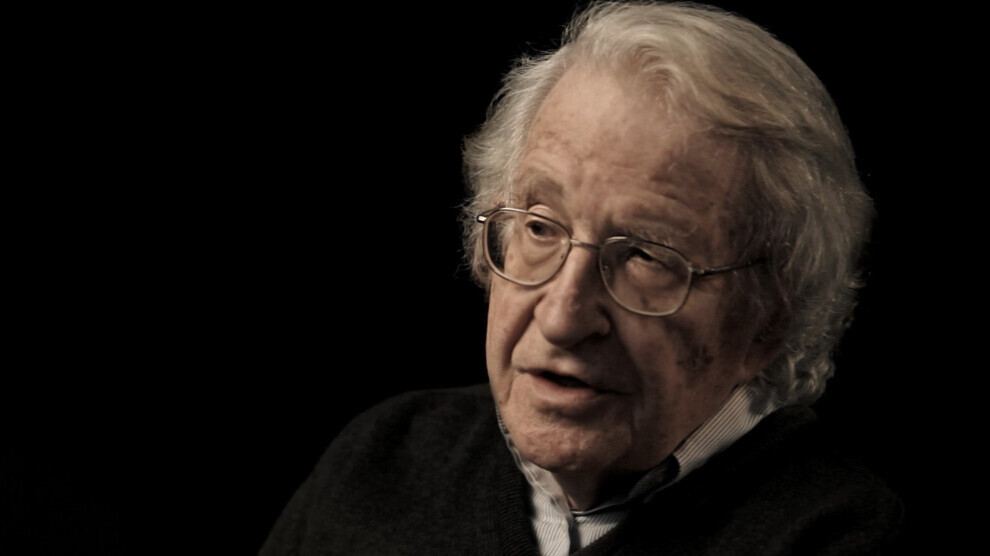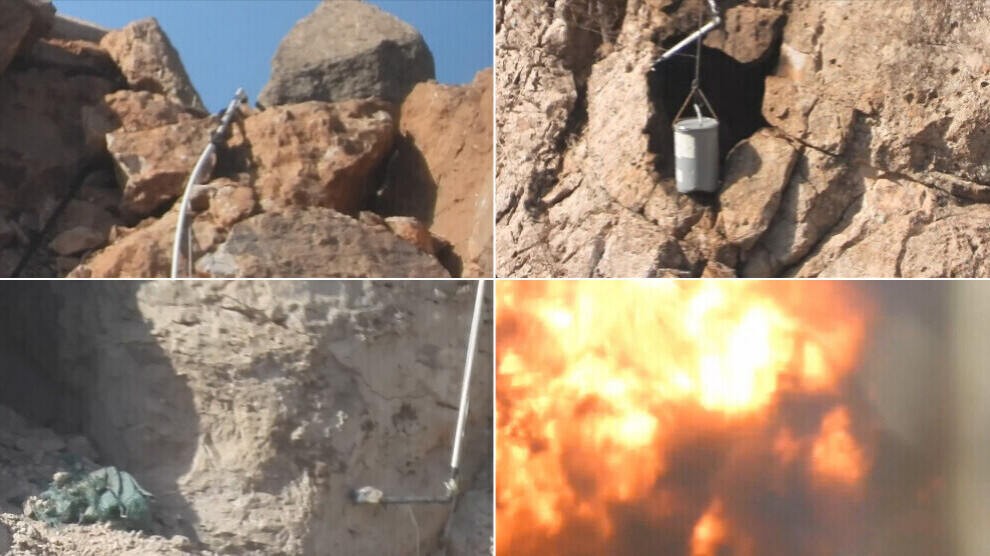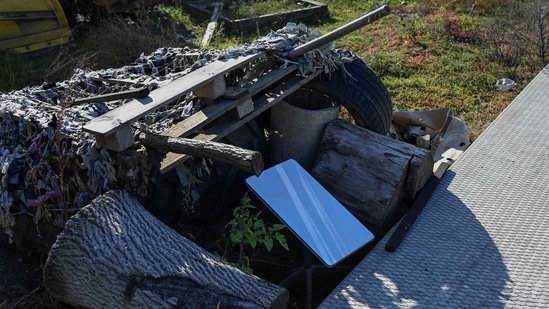Noam Chomsky said it can't be expected that criminal states investigate their own crimes.

ANF
NEWS DESK
Saturday, 26 Nov 2022
World-renowned philosopher Noam Chomsky commented on Turkey's use of chemical weapons against Kurdistan.
Chomsky said that the Turkish state would not accept investigations into allegations of the use of chemical weapons in northern Iraq, nor would they accept investigations into previous and more recent crimes.
Noam Chomsky spoke to Medya Haber TV's presenter Selehattin Işıldak.
“The Kurdish people do not have a government that can speak up for them,” say dozens of intellectuals who call for action against the use of chemical weapons against the Kurds.

ANF
NEWS DESK
Wednesday, 30 Nov 2022
131 academics, activists, unionists, NGO representatives and politicians wrote an open letter calling for actions from various authorities regarding the use of chemical weapons by the Turkish army against the Kurdish guerrilla forces in southern Kurdistan (northern Iraq).
The signatories call for an urgent end to all cross-border military activity of the Turkish state in Iraq and Syria, criticizing the existing international mechanisms for not reflecting the realities of warfare today.
The open letter reads as follows:
“On the occasion of November 30, the Day of Remembrance of all Victims of Chemical Warfare, we write with deep concern about disturbing allegations of the use of prohibited weapons by the Turkish military in its ongoing military operations against the Kurdistan Workers’ Party (PKK) in the Kurdistan Region of Iraq. Moreover, we are writing at a time in which the Turkish state is once again targeting civilians inside Syria and mobilizing for another possible ground invasion.
On October 18, local media released video footage showing the impacts of alleged chemical weapons exposure on two PKK guerrillas. Both were among 17 of the group’s fighters who lost their lives as a result of alleged chemical attacks in recent months.
The footage followed a report published by the NGO International Physicians for the Prevention of Nuclear War (IPPNW) last month that examined other allegations of Turkish chemical weapons use and called for an international investigation based on its findings.
In 2021, human rights monitors and local media reported at least once instance of civilian harm potentially caused by alleged Turkish chemical weapons use. The authors of the IPPNW report attempted to meet with the impacted civilians, but were blocked from doing so by the Kurdistan Regional Government.
We understand that the Organisation for the Prohibition of Chemical Weapons (OPCW) can only investigate allegations of chemical weapons use when a request is made by a state party.
However, it is our view that these existing mechanisms do not reflect the realities of warfare today. Peoples without states and non-state political and military actors are deeply involved in modern conflicts. So are autocratic regimes that stifle the voices of those who wish to hold their governments to account for their behavior in war.
Both of these conditions are relevant here. The Kurdish people do not have a government that can speak up for them. They live under repressive regimes with powerful allies in the West—Turkey, for example, is supported by its NATO allies despite consistent evidence of serious human rights abuses.
This means that, while Kurds are disproportionately more likely to be subjected to war crimes and violations of international law as a result of their status as an oppressed minority, they are also disproportionately less likely to have access to justice mechanisms to hold perpetrators accountable.
In order to be effective, human rights law and the laws of war must be implemented as universally as possible, free from political considerations. There should be as many avenues as possible for credible allegations of human rights violations and violations of the laws of war to be investigated by impartial international bodies—particularly serious violations like the use of prohibited weapons.
Furthermore, these investigations should not simply be aimed at the historical record. They should build towards justice and accountability for all who violate international law, as well as durable political solutions to ongoing conflicts.
To that end, we the undersigned make the following recommendations:
To the OPCW:Amend investigation procedures to allow greater access to justice and accountability for alleged chemical weapons use.
Investigate allegations that Turkey may have used chemical weapons in Iraqi Kurdistan.
To the government of Turkey:End all cross-border military activity in Iraq and Syria immediately.
Cooperate fully with local and international investigations of alleged chemical weapons use and other alleged war crimes and human rights abuses and hold perpetrators accountable if violations are found.
Return to peace negotiations with the PKK to resolve the Kurdish issue by political means.
To the Kurdistan Regional Government:Allow international investigators full access to impacted regions and communities to determine if Turkey has used chemical weapons in its military operations.
To concerned governments:Request an investigation of alleged Turkish chemical weapons use via existing OPCW mechanism.
End arms sales and security assistance to Turkey.
Pressure Turkey to end cross-border military operations in Iraq and Syria.
Support and assist in return to peace negotiations between Turkey and the PKK to resolve the Kurdish issue by political means.
To international civil society:Support the demands listed here by signing this letter and engaging with relevant governments and international institutions.”
Signatories:
Souad Abdelrahman, Head of Palestine Women’s Association - Palestine
Dr Goran Abdullah - Scotland
Ismet Agirman, Kurdish activist - UK
Prof Dr Tayseer A. Alousi, Secretary General of the Arab Assembly for Supporting Kurdish Issue and President Sumerian Observatory for Human Rights - Netherlands
Dr Maha Al-Sakban, Centre for Women’s Human Rights board member - Iraq
Mick Antoniw MS, Senedd Constituency Member, Welsh Labour Group, Counsel General and Minister for the Constitution - Wales
Chiara Aquino, PhD Candidate, University of Edinburgh - Scotland
Benedetta Argentieri, Journalist and filmmaker - Italy
Rezgar Bahary, Journalist - UK
Naamat Bedrdine, Politician and writer - Lebanon
Walden Bello, International Adjunct Professor of Sociology, SUNY Binghamton, and recipient of the Right Livelihood Award (aka Alternative Nobel Prize) in 2003 - USA
Janet Biehl, Independent scholar, author, artist - USA
Jonathan Bloch, Writer - UK
Baroness Christine Blower, House of Lords - UK
Debbie Bookchin, Journalist and author - USA
Prof Bill Bowring, School of Law, Birkbeck College, University of London - UK
Jane Byrne, Teacher - UK
Robert Caldwell, Assistant Professor of Indigenous Studies, University at Buffalo – USA
Campaign Against Criminalising Communities (CAMPACC) - UK
CND (Campaign Against Nuclear Disarmament) - UK
Margaret Cerullo, Hampshire College - USA
Maggie Cook, UNISON NEC member - UK
Mary Davis FRSA, Visiting Professor of Labour History at Royal Holloway University of London - UK
Defend Kurdistan Initiative - UK
Mary Dibis, Mousawat for Women - Lebanon
Penelope Dimond, Writer and actor - UK
Gorka Elejabarrieta Diaz, Basque Senator, Director EH Bildu International Relations Department - Basque Country
Federal Executive Committee of Women’s Union Courage - Germany
Silvia Federici, Author and Professor Emerita of Social Science, Hofstra University - USA
Andrew Feinstein , Executive Director, Shadow World Investigations - UK
Dr Phil Frampton, Author - UK
Freedom Socialist Party - Australian Section
Freedom Socialist Party - USA Section
Andreas Gavrielidis, Greek-Kurdish Solidarity
Lindsey German, Convenor Stop the War Coalition - UK
Selay Ghaffar, Exiled women’s rights activist from Afghanistan
Prof Barry Gills, Fellow of the World Academy of Art and Science - UK
Dr Sarah Glynn, Writer - France
Mustafa Gorer, Kurdish activist - UK
Kirmanj Gundi, KHRO (Kurdistan Human Rights Observer) - UK
Prof Michael Gunter, General Secretary of EU Turkey Civic Commission (EUTCC) - USA
Rahila Gupta, Chair of Southall Black Sisters - UK
Kazhal Hamarashid, Board member of the Toronto Kurdish Community Centre - Canada
Niaz Hamdi, KHRO (Kurdistan Human Rights Observer) - UK
John Hendy QC, Barrister - UK
Nick Hildyard, Policy analyst - UK
Ava Homa, Writer, journalist and activist - Canada/USA
Srecko Horvat, Co-founder of DiEM25 & Progressive International
Dr Stephen Hunt, PiK Ecology Network - UK
John Hunt, Journalist - UK
Alia Hussein, Women’s Affairs Committee of the General Federation of Iraqi Trade Unions - Iraq
Lord Hylton, House of Lords - UK
Serif Isildag, Journalist - UK
Ruken Isik, Adjunct Lecturer at American University - USA
Dafydd Iwan, Former President Plaid Crymru – Wales
Jin Women’s Association - Lebanon
Ramsey Kanaan, Publisher, PM Press - UK
James Kelman, Author - Scotland
Gulay Kilicaslan, Department of Law and Legal Studies, Carleton University - Kanada
Nida Kirmani, Women Democratic Front, Haqooq-e-Khalq Party – Pakistan
Nimat Koko Hamad, Associate researcher and gender specialist - Sudan
Kongra Star Women’s Movement – Rojava & Syria
Claudia Korol, Founder of Popular Education Collective Pañuelos en Rebeldía, Feministas de Abya Yala - Argentina
Balazs Kovacs, Consultant - UK
Kurdish Women’s Relations Office (REPAK) – Kurdistan Region of Iraq
Şeyda Kurt, Journalist and Writer - Germany
Coni Ledesma, International Women’s Alliance (IWA) Europe - Netherlands
Dr Anjila Al-Maamari, Center for Strategic Studies to Support Women and Children - Yemen
Aonghas MacNeacail, Scottish Gaelic poet - Scotland
Fazela Mahomed, Kurdish Human Rights Action Group - South Africa
Saleh Mamon, Campaign Against Criminalising Communities (CAMPACC) - UK
Dr Carol Mann, Director of Women in War - France
Mike Mansfield QC, Barrister - UK
Dr Thomas Jeffrey Miley, Lecturer of Political Sociology, Fellow of Darwin College, University of Cambridge - UK
Zahraa Mohamad, Journalist - Lebanon
Francie Molloy, MP for Mid Ulster - Ireland
David Morgan, Journalist - UK
Baroness Jones of Moulsecoomb, Green Party Member of the House of Lords - UK
Maryam Namazie, Human rights activist, commentator, and broadcaster - UK
Dr Marie Nassif-Debs, President of Association Equality-Wardah Boutros - Lebanon
Doug Nicholls, General Secretary, General Federation of Trade Unions - UK
Margaret Owen, O.B.E., President Widows for Peace through Democracy - UK
Prof Felix Padel, Research associate at Center for World Environmental History, University of Sussex - UK
Sarah Parker, Anti-Capitalist Resistance - UK
Patriotic Democratic Socialist Party (PPDS) - Tunisia
Peace in Kurdistan Campaign - UK
Maxine Peake, Actress - UK
Rosalind Petchesky, Distinguished Professor Emerita of Political Science, Hunter College & the Graduate Center, City University of New York – USA
Dr Thomas Phillips, lecturer in law at Liverpool John Moore University - UK
Eleonora Gea Piccardi, University of Coimbra, PhD candidate - Italy
Ulisse Pizzi, Geologist, UK engineering consultancy - UK
Dr Anni Pues, International human rights lawyer - UK
Radical Women - USA
Radical Women - Australia
Bill Ramsay, Ex-President Educational Institute of Scotland and Convenor of Scottish National Party – Scotland
Ismat Raza Shahjahan, President of Women's Democratic Front - Pakistan
Trevor Rayne, Fight Racism! Fight Imperialism! - UK
Gawriyah Riyah Cude, Women’s Trade Union Forum - Iraq
Dimitri Roussopoulos, Writer, editor, publisher, political activist - Canada
Nighat Said Khan, Women's Democratic Front, Women's Action Forum WAF - Pakistan
Dr Michael Schiffmann, Linguist, English Department of the University of Heidelberg, Translator - Germany
Paul Scholey, Morrish Solicitors - UK
Bert Schouwenburg, International Trade Union Advisor - UK
Chris Scurfield, Political activist - UK
Stephen Smellie, Deputy Convenor UNISON Scotland and NEC member - Scotland
Geoff Shears, Vice-Chair of the Centre for Labour and Social Studies(CLASS) - UK
Tony Shephard, Musician and graphic designer - UK
Tony Simpson, Bertrand Russell Peace Foundation - UK
Radha D'Souza, Professor of law at the University of Westminster - UK
Oskar Spong, Operator - UK
Chris Stephens MP, Glasgow South West - Scotland
Steve Sweeney, International Editor, Morning Star - UK
Tooba Syed, Women Democratic Front - Pakistan
Greta Sykes, Writer and artist - UK
Tim Symonds, Novelist - UK
Joly Talukder, General Secretary of the Bangladesh Garment Workers Trade Union Centre - Bangladesh
Latifa Taamalah Women’s Committee - Tunisia
Shavanah Taj, General Secretary Wales TUC - Wales
Lisa-Marie Taylor, CEO of FiLiA - UK
Saadia Toor, Women Democratic Front - Pakistan
Tom Unterrainer, Bertrand Russell Peace Foundation - UK
Prof Abbas Vali, Professor of Modern Social and Political Theory - UK
Dr Federico Venturini, University of Udine - Italy
Andy Walsh, Chair, Greater Manchester Law Centre - UK
Julie Ward, Former MEP - UK
Arthur West, Secretary, Kilmarnock and Loudon Trades Union Council - Scotland
Prof Kariane Westrheim, Chair of EU Turkey Civic Commission (EUTCC) - Norway
Alex Wilson, PhD student at York University in Toronto, Ontario - Canada
Dr Fiona Woods, Lecturer, Technological University Shannon - Ireland
Paula Yacoubian, Member of Parliament - Lebanon
Rosy Zúñiga, Latin America and Caribbean Popular Education Council CEAAL - Mexico







